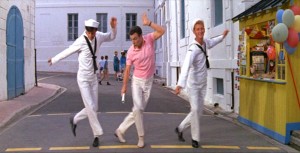Written in November 2017 for my “En movimiento” column in Caimán Cuadernos de Cine. — J.R.
En movimiento: The Crimes of Harvey Weinstein
Although we routinely assume that social trends have a rational basis, the processes by which irrational forms of displacement also affect those trends are no less routinely ignored. For instance, it’s commonly thought that the Watergate scandal leading to Richard Nixon’s resignation as U.S. President was merely a matter of exposing his crimes, but it could also be argued that many of these crimes were already evident to U.S. citizens before Nixon won his last Presidential election. As Mary McCarthy would later theorize, it was because the public needed a scapegoat for the U.S. debacle in Vietnam that the Watergate crimes belatedly became important. And one might similarly theorize that the recent public exposure and condemnation of producer-distributor Harvey Weinstein as a sexual predator, which has led to many similar exposures of predatory sexual behavior by others in the film world (such as James Toback and Kevin Spacey) as well as in separate fields, has been a displaced response to the debacle of Donald Trump’s Presidency, not to mention his own primitive sexual politics, which were exposed by the release of a private tape during the Presidential campaign.
Even though we can applaud this belated exposure of Weinstein’s vile treatment of many women, the silence and seeming indifference about his behavior towards both artists and viewers over the same period has been disturbing. As a brutal cultural commissar Weinstein enjoyed a dominance that was often celebrated in the press, so that the New York Times’ principal film reviewer Janet Maslin devoted far more coverage to Weinstein’s disapproval of the 1999 Cannes awards than she did to the films such as Rosetta and L’humanité that were honored by David Cronenberg’s jury. She was less forthcoming about his role in recutting many of the films he controlled, sometimes to ruinous effect (as in the case of Chen Kaige’s Temptress Moon), and dumping or marginalizing many of the most important films he distributed in the U.S., such as Dead Man, Les demoiselles de Rochefort, Jour de fête, and Through the Olive Trees. (In the case of Dead Man, Weinstein’s company actually discouraged some venues from showing it after Jarmusch prevented Weinstein from recutting it.)
If, however, one believes, as many American journalists apparently do, that the primary reason for cinema’s existence is to make money for people like Weinstein, and to do so according to his own aesthetic taste, then his crimes against art don’t really qualify as crimes at all. Speaking for myself, every time I see the slogan at the start of a DVD or Blu-Ray, “Piracy is not a victimless crime,” I feel like replying, “Capitalism is not a victimless crime.” But according to the American press, the victims of Harvey Weinstein are exclusively the women he preyed upon, not the artists or viewers or films he abused throughout his career.





